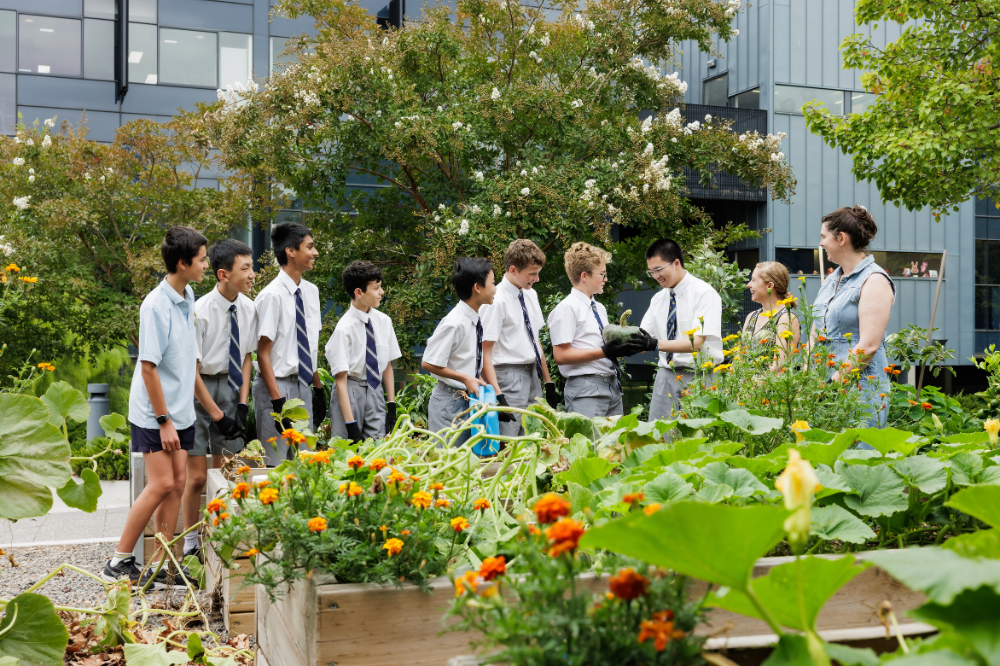
Sustainability has been a long-term priority for Camberwell Grammar School, which began its sustainability journey in 2015.
Sustainability was embedded in the school’s strategic plan in 2020 under the key priority pillar of “Conducting Sustainable and Secure Operations” with the goal to “be a responsible, ethical global citizen, as a leader in sustainability.” The school aims to achieve this by focusing on operational efficiencies and promoting sustainable initiatives in curriculum and co-curricular programming.
In 2023, Camberwell Grammar School created a new sustainability project coordinator role to appropriately and effectively resource the sustainability program. A significant project was undertaken to introduce an additional Food Organics and Garden Organics (FOGO) waste stream, where collected food waste and industrially compostable bio-packaging are processed into compost and animal feedstock.
2023 projects also included the introduction of “zero landfill” school and community on-site events, a greater partnership between the school and its catering contractor to improve responsible procurement and purchasing, especially with regard to food packaging, improved management of the oval water recycling system and numerous student engagement opportunities within and beyond the classroom.
In 2023, the school generated 1106 tonnes of carbon dioxide equivalent emissions, slightly underperforming the 2023 target of 1099 tonnes but with a 61.5% reduction from the 2017 baseline year. This is largely attributed to the procurement of 100% renewable electricity in 2022 to support the school’s additional electricity needs over and above those produced by the on-site 888-kWh solar array.
Headmaster Dr Paul Hicks says, “We envisage becoming a leader in sustainability, fostering a whole-school approach to carbon emission balance. Ongoing sector projects will continue working towards Net Zero targets, emphasising the goal of instilling knowledge in students that they possess the power and agency to bring about positive change, starting in their own surroundings and extending to make the world a better place.”
Despite setting such an ambitious target, Dr Hicks emphasises it’s an all-encompassing approach.
“We have learned that we can make small changes and that those changes accumulate to make a big difference,” he says. “This is one aspect of a multifaceted approach to get to our target of zero emissions by 2030.”
Camberwell Grammar School strategically documents its emission reduction plans. A sustainability plan was developed to set annual emission reduction targets across resource sectors, along with priorities and community engagement actions. 2023 was the first year quarterly and annual reporting tracked the progress of “Net Zero by 2030” targets.
“Water, road transport and gas consumption met 2023 targets, while waste, energy and procurement made progress but remained challenging. The school runs on renewable energy, with priorities on reducing electricity use and exploring electrification innovations. Key goals include responsible purchasing, increasing recycling, minimising landfill and encouraging active transport,” says Jo Menzies, sustainability project coordinator. “Streamlining data reporting, analysing resource performance to guide our next steps, integrating sustainability into the curriculum and engaging the community are vital steps.”
Student involvement is a key part of the strategy, as the school leadership believes it will help them make an impact beyond their days at Camberwell Grammar School.
“We are fortunate to work with students who are eager to develop skills that help them contribute to solutions,” says Will Hone, English and history teacher and school sustainability coordinator. “Student initiatives include developing a pitch for solar energy, mapping out a commingled waste stream, conducting biodiversity and waste audits, and expanding the burgeoning gardening and beekeeping programs.”
Staff are also encouraged to be advocates, which has led to sustainability practices being integrated into the school’s purchasing policy.
Business Manager Cameron Blew says, “Staff are required to consider environmental, social and ethical impacts when purchasing products and services. The policy emphasises that materials should be reused, repurposed or recycled to minimise landfill waste.”
This collective effort ensures that sustainability is embedded in the school’s culture.
Camberwell Grammar believes its Net Zero commitment will embolden students, empower teachers and energise the local population to secure a sustainable future.
Jess Stryker, head of facilities and operations, highlights how all stakeholders come together.
“Shared responsibility is required at each level to ensure that the school’s Net Zero initiative not only transforms our operations, but also serves as a powerful teaching tool for the entire school community, fostering a deep understanding of sustainability and the real-world impact of collective action,” she says. “The collaboration between our executive and board leadership, operations and property teams and passionate teachers and students is essential. We truly believe that only with these groups working together will we be able to establish the momentum required to reach this significant undertaking.”


